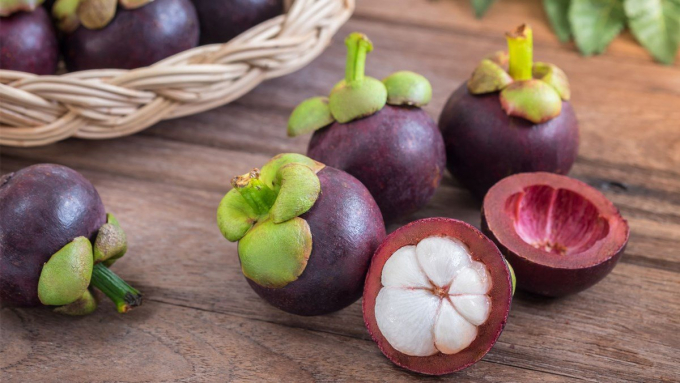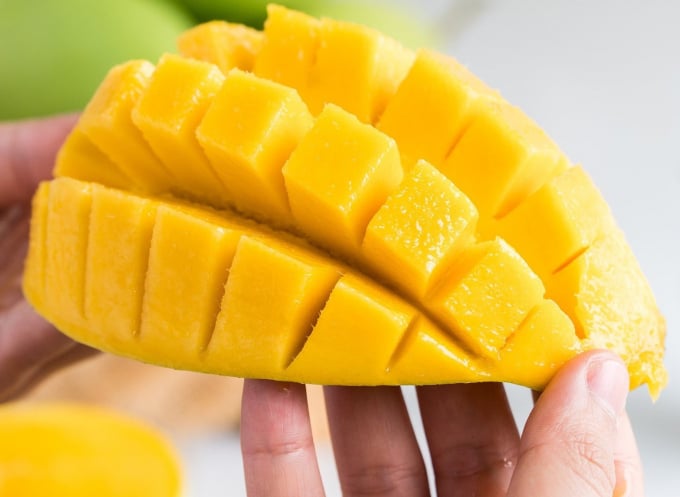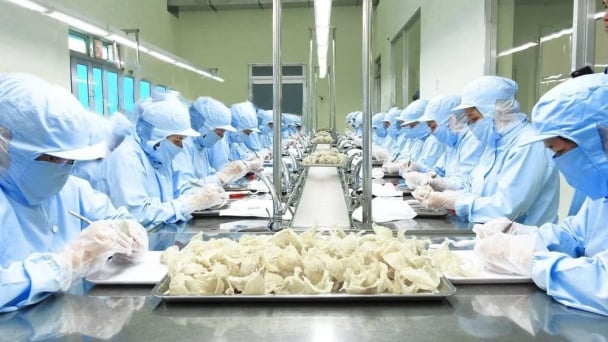May 16, 2025 | 11:33 GMT +7
May 16, 2025 | 11:33 GMT +7
Hotline: 0913.378.918
May 16, 2025 | 11:33 GMT +7
Hotline: 0913.378.918

Vietnam’s mangosteen has high quality.
Despite the import turnover still takes a very small share of the whole EU’s market, these fruits from Vietnam are having a strong increase.
According to the statistics from the European Statistics agency (Eurostat), the group of fruits coded HS 080450 that includes mangoes, guava and mangosteen saw a gradual import increase yearly in the period of 2016-2020. The average increase in quantity was 8.4% per year, and in value was 7.7% per year.
Despite the strong impact of Covid-19 pandemic, in 2020, the EU imported a large amount mangoes, guava and mangosteen, increased boldly in quantity and value, reached 665.4 thousand tons with the value of EUR 1.1 billion (equivalent to US$ 1.29 billion), increased 8.5% in quantity and 6.5% in value compared to 2019.
In the first 5 months of 2021, the EU continued to increase importing mangoes, guava and mangosteen, reached 343.9 thousand tons, valued EUR 525.5 million (equivalent to US$ 614.8 million), increased 7.0% in quantity and 3.1% in value compared to the same period of 2020. The average import price in the first 5 months of 2021 was EUR 1,527.9 per ton, decreased 3.7% compared to the same period of 2020.
The EU imports mangoes, guava and mangosteenmostly from Peru, the Netherland and Brazil in the first 5 months of 2021. The imported amount from these 3 markets accounts for 73.5% of the gross imported amount of the EU.
Vietnam is the 31st biggest supplier of mangoes, guava and mangosteen for the EU, with the proportion is just 0.4% of the gross imported amount of the EU.
It is notably that the import of mangoes, guava and mangosteen from Vietnam into the EU’s market is growing strongly, with an increase of 222.1% in quantity (reached 131 tons) and 276.1% in value (reached EUR 829,000) in the first 5 months of 2021.

Vietnam’s Cat Chu mangoes are being exported to many markets in the world.
In the classification of code HS 080450, mango is a popular tropical fruit and its consumption increases continuously because the price is more reasonable to the EU’s consumers.
According to the Vietnam Trade Office in Belgium, Luxembourg and the EU, the Netherland plays animportant central role in trading the mangoes in Europe. It is around 55% of mangoes consuming in all over Europe being imported and traded by the Netherland’s enterprises.
Most of imported mangos by the Netherland’s enterprises are then exported to Germany (account for 43%), France (account for 10%). The remaining amount is distributed to Belgium, the UK, Scandinavia and the Russia (even though the Russia prohibites the import of mango).
The Netherland is a big market for mango in Europe. Mangoes are sold in many supermarkets in the Netherland and are now popular with variety products like fresh sliced mango.
Germany is also a big market for mango in Europe. In this country, mango is somewhere and somehow seen as an interesting strange fruit, but it is becoming more popular recently. People here are becoming familiar with mango, so the demand might grow in the coming years.
It is notable by the Vietnam Trade Office in Belgium, Luxembourg and the EU that most kinds of tropical mango are consuming on the EU are a little bit sour when they are ripe. When the mangoes are slightly green, they are sweeter and more crunchy. And when you are comparing Vietnam’s mangoes with many other tropical mangoes, Vietnam’s mangoes are much more distint, tasty and delicious. That is a superiority advantage of Vietnam’s mangoes.
Mango is one of the main tropical fruits grown in Vietnam after banana. Vietnam is the 13rd biggest mango exporter in the world, with a growing area of over 87,000 hectares nationwide. In 2020, the gross amount of mango harvested was 893.2 thousand tons, increaed 6.5% compared to 2019.
Vietnam’s mango is regarded as a big potential fruit for export to any market and it has contributed to the development of agriculture sector. In Vietnam, mango is planted around the year and this fruit has a stable quality in any season. It is an important advantage that help enterprises being proactively when signing contracts for export.
Translated by Khanh Linh

(VAN) Japan's efforts to lower the price of rice through the release of its stockpile may finally be making some progress, albeit at a snail's pace.

(VAN) U.S. tariffs are not only a 'shock', but also an opportunity for Vietnamese businesses to renew their mindset toward comprehensive development.

(VAN) As Bac Giang lychee enters the harvest season, Minister Do Duc Duy expects that the fruit will contribute greatly to agricultural exports due to standardized production and deep processing.

(VAN) Consumers have shown a preference for free-range eggs, but those farming systems are more vulnerable to biosecurity risks like bird flu.
/2025/05/09/5701-1-184335_301.jpg)
(VAN) Vietnam’s eel exports nearly doubled thanks to a mud-free farming model, opening up new prospects while still facing numerous barriers related to international standards.

(VAN) Minister Do Duc Duy warned that if production is not professionalized and supply chains are not transparent, the U.S. market could become a growth bottleneck.

(VAN) Delegating surveillance responsibilities to local authorities is a cost-saving and efficiency-boosting measure that removes a key bottleneck for enterprises, according to Director General Duong Tat Thang.